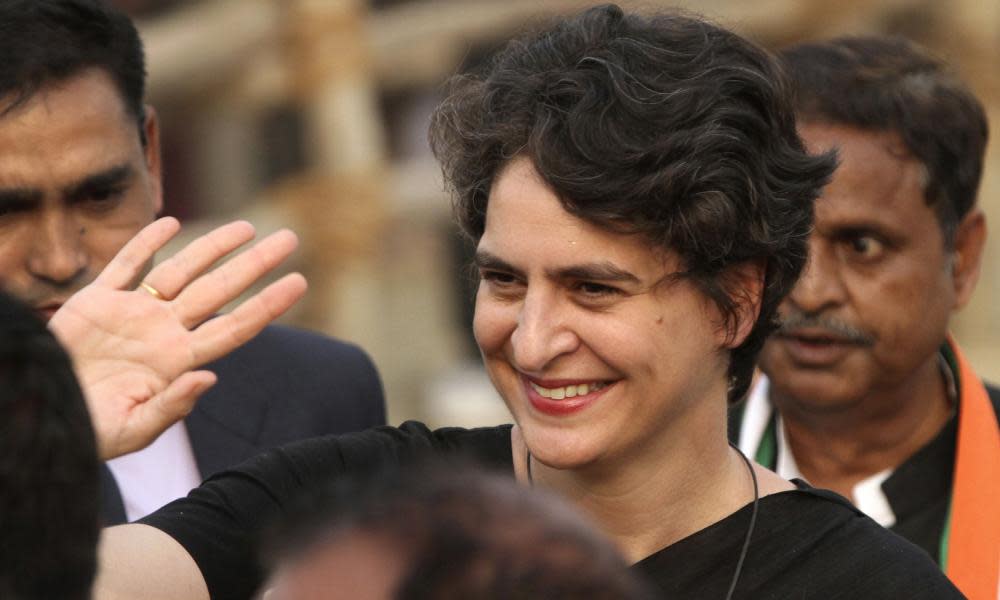Priyanka Gandhi enters politics months before India general election

Priyanka Gandhi, a scion of India’s most powerful dynasty who has rebuffed calls to enter politics for years, has been appointed as an official in the Congress party just months before India’s national polls.
The elevation of Gandhi, 47, is the latest chapter for the Nehru-Gandhi family that helped lead India to independence 71 years ago and which has ruled the country for much of the time since.
Less than three months before Indians are expected to begin voting in the world’s largest elections, commentators said her formal entry into politics could boost Congress party momentum and refresh a dynasty that some commentators have said is exhausted.
Gandhi, who also goes by the surname Vadra since her marriage, has been appointed as the party’s general-secretary for eastern Uttar Pradesh, overseeing an area containing one of the constituencies of the current prime minister, Narendra Modi, in a state of more than 200 million people with the most parliamentary seats on offer.
She is considered a more charismatic campaigner than her brother, the current Congress party chief, Rahul Gandhi, with presence and an appearance that are often compared to that of her grandmother Indira Gandhi, a formidable and controversial prime minister, who was assassinated in 1984.
Shortly after the announcement on Wednesday, Congress party workers in the Uttar Pradesh capital, Lucknow, held up posters reading: “Indira is back.”
“We’re fired up & ready to go!” the party said on its Twitter account under a list of the new appointments, including Gandhi’s.
Gandhi, the daughter, granddaughter and great-granddaughter of Indian prime ministers, has campaigned informally in the family’s ancestral homelands in eastern Uttar Pradesh but has resisted entering politics herself for more than two decades.
“Frankly, I’m not sure I’ve figured out why myself,” she said of her reluctance in a 2009 interview.
“But I’m very clear I don’t want to be in politics. I’m very happy living my life the way I am. I think there are certain aspects of politics which I’m just not suited to.”
Author and journalist Sagarika Ghose, a biographer of Indira Gandhi who has interviewed Priyanka several times, said she had the potential to command voters’ attention in Uttar Pradesh and had particular appeal among women.
“A woman Gandhi is a very powerful symbol and Indira Gandhi’s mystique lives on,” she said. “It’s a ballsy move. Let’s face it: she’s striking and photogenic and this is the politics of spectacle.”
But she said the next months would also be an unprecedented test of Gandhi’s political skills. “So far she’s been able to just dip her toe in politics and then come out of it and go on holidays,” Ghose said. “Now she has actually taken the plunge and will really have to prove herself.”
The ruling Bharatiya Janata party (BJP) is likely to use the appointment to sharpen its attack on Congress as a party of nepotism. Modi told party workers after the announcement that for Congress, a family was the party, unlike the BJP, for which the party was family.
“The Congress has basically publicly announced that Rahul Gandhi has failed and needs crutches from within the family,” said BJP spokesman Sambit Patra.
He said the announcement was intended to boost party morale after the Congress party appeared to be sidelined from an alliance of opposition parties that has formed in recent weeks to take on Modi. “Because of his rejection by grand alliance parties, he has opted for a family alliance,” Patra said.
Gandhi’s husband, Robert Vadra, has also been accused of engaging in corrupt land deals by political opponents, allegations he says are baseless but which could be given a fresh airing after Wednesday’s announcement.
Modi enters India’s election season appearing as weak as he has ever been while in power after losing three state elections in December and amid wide discontent with an economy that is growing quickly but failing to create enough good jobs to match the aspirations of a young and restless country.
But his personal popularity is still thought to be high and no other figure, either within his party or among his opponents, has emerged as a strong alternative leader.

 Yahoo News
Yahoo News 
